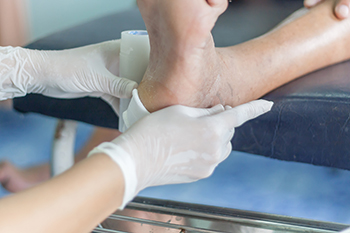
An injury that breaks through the skin is called a wound. Small wounds on the feet may heal naturally whereas larger and deeper wounds may require assistance. After the hands are thoroughly washed, pressure can be applied to stop existing bleeding. This is generally followed by cleaning the wound with water and saline solution and removing any foreign objects from it. Many times an antibiotic cream is applied to it to help prevent an infection from developing. A dressing is then put over it and changed daily to ensure the wound is kept clean. Wounds can develop for various reasons and generally require prompt medical attention. Wounds can occur due to a human or animal bite, an injury, or getting cut by a dirty or rusty object. Additionally, if there is blood coming from the wound that cannot be stopped, it is strongly urged to contact a podiatrist who can effectively treat wounds on the feet.
Wound care is an important part in dealing with diabetes. If you have diabetes and a foot wound or would like more information about wound care for diabetics, consult with one of our podiatrists from Barry University Foot and Ankle Institute. Our doctors will assess your condition and provide you with quality foot and ankle treatment.
What Is Wound Care?
Wound care is the practice of taking proper care of a wound. This can range from the smallest to the largest of wounds. While everyone can benefit from proper wound care, it is much more important for diabetics. Diabetics often suffer from poor blood circulation which causes wounds to heal much slower than they would in a non-diabetic.
What Is the Importance of Wound Care?
While it may not seem apparent with small ulcers on the foot, for diabetics, any size ulcer can become infected. Diabetics often also suffer from neuropathy, or nerve loss. This means they might not even feel when they have an ulcer on their foot. If the wound becomes severely infected, amputation may be necessary. Therefore, it is of the upmost importance to properly care for any and all foot wounds.
How to Care for Wounds
The best way to care for foot wounds is to prevent them. For diabetics, this means daily inspections of the feet for any signs of abnormalities or ulcers. It is also recommended to see a podiatrist several times a year for a foot inspection. If you do have an ulcer, run the wound under water to clear dirt from the wound; then apply antibiotic ointment to the wound and cover with a bandage. Bandages should be changed daily and keeping pressure off the wound is smart. It is advised to see a podiatrist, who can keep an eye on it.
If you have any questions, please feel free to contact our offices located in Miami, North Miami Beach, Miami Beach, and Tamarac, FL . We offer the newest diagnostic and treatment technologies for all your foot care needs.
